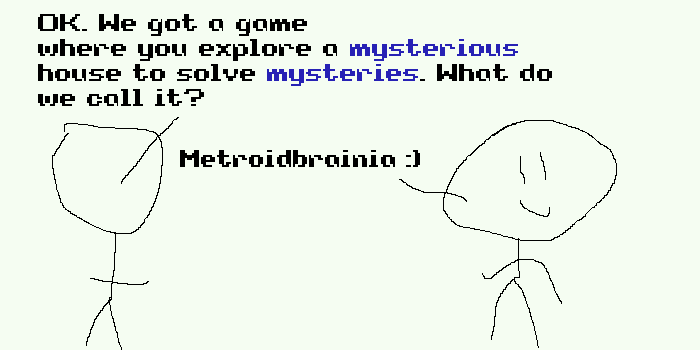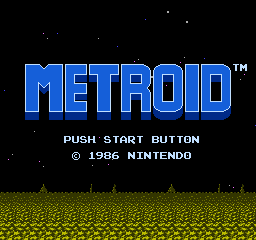Metroidbrainia is a bad term and here's why

Okay, no flowery preamble let's just go. What do people mean when they say this though? For purposes of this article, we are describing the loose collection of games that meet the following criteria:
Games wherein part of the core gameplay loop is collecting clues and synthesizing them to make progress through strict logic, intuitive leaps, or experimentation in the game world.
I think this is a fair description of most of the games that I see people call Metroidbrainias, except for the ones where I think this is ESPECIALLY wrong and they belong in another genre entirely. In particular, the "canon" examples I'm thinking of while writing this might include:
- Tunic
- Outer Wilds
- Void Stranger
- Animal Well
- The Witness (No. This is a puzzle and hidden object game.)
- Blue Prince (but we'll fucking get to that!!)

Why I don't like it
- It is not a good descriptor of its genre and requires specific knowledge of another term that is also a bad name for its genre. Metroidvania is also bad, and I think this bears out in the fact that mature mediums generally don't have terms like "Doomlike" anymore. This is even worse because it's a second-order term derived from something that has basically no relation to it. It conveys absolutely no useful information about games in its category unless you're familiar with weird game taxonomy. That said, not containing any useful information alone would not make me write an article. Many genre names have this problem and are bad.
- It suggests you're stupid if you do not get a particular game. This isn't sour grapes, I love these kinds of games and have a lot of notches in my belt for really obtuse and difficult puzzlers in general. But the obtuseness is kind of the point in a lot of cases. The implication that not making some of the more absurd connections these games ask of you is purely a "you" problem contributes to a culture around puzzle media in general that I consider to be actively unfun. (Also see the extreme amount of shaming some people dish out for looking up answers, both in these kinds of games and in the puzzle genre more broadly!)
- Beyond having no information, it is actively misleading as a starting point. Putting "Metroid" in there when there is no metroid game that behaves this way is silly and also suggests that the side-scrolling-platforming milieu is a key part of it and - surprise, it super isn't! Remember that list earlier? The only one that you wouldn't get a misleading impression of this from is Animal Well.
- Its badness as a term leads to games being lumped together that absolutely are not in the same category. Calling "The Witness" a metroidbrainia is absolutely absurd. It's a puzzle game first and foremost. This becomes much clearer if you consider how the game is experienced as opposed to thinking in purely literal terms about it. Even the best example of a close cousin that fits more in the so-called brainias, Fez, feels extremely different to play and deciper compared to The Witness. Part of this is that the much-vaunted environmental elements of The Witness, while fun in small doses, are effectively a very trussed up hidden object game, but that's another discussion.
Now, all of this is enough to seriously consider using another word for this genre, in my opinion. But the nail in the coffin is my personal bugbear and why I felt compelled to write this to begin with.

Mystery Games
That's my final bullet point - We have a better name for this genre already. Just call them Mystery Games! Let's consider this definition:
mystery story, ages-old popular genre of tales dealing with the unknown as revealed through human or worldly dilemmas; (via Britannica)
Alright, so what's it like - say - reading a mystery novel or watching a mystery movie? You are generally presented with a puzzle of some kind - most commonly a crime - and over the course of the narrative you receive a number of clues, revelations, and other drip-fed information. While you can simply kick back and watch the usually-devilishly-clever point of view character eventually solve the puzzle, it's commonly understood that the most fun way to engage with media like this is to be thinking about and theorizing about what you're seeing and what the answer might be. The shared "ah-ha!" and "how could I be so stupid?" moments are a hallmark of the genre and well regarded by its fans.
Does that sound like anything? Does it remind you of piecing together what something meant in Tunic, making a leap of logic in Outer Wilds, or feeling very silly for missing an obvious (but hidden) path in Animal Well? Games are an incredible medium for mysteries! Unlike many other formats, game mysteries need not reveal the answer at a predetermined point in the narrative, allowing everyone to puzzle on things and come to conclusions at their own pace and with different found clues and resources. Further, they're absolutely incredible at containing many sub-mysteries, which can be very difficult to handle elegantly in a non-interactive medium. It's difficult to construct, to be sure, which is why the list of games people usually consider to be this genre's "canon" is so short, but it's such a rewarding type of game to go through if it clicks right for you, and I think that's so powerful.
After all, if I didn't care about describing these games accurately, I would not sit here and write all these words about why I hate one of the prevailing terms so much. Seeing Blue Prince - something that is quite literally about unraveling mysteries in a very traditional mystery story location - be described as a "metroidbrainia" was the last straw for me. These games are so, so much more than a vapid collection of genre signifiers from old games we're all still using as lodestars even though they came out literal decades ago at this point! Further, by putting the experience they give front and center, it becomes so much easier to explain why they're fun and whether or not you might enjoy a given entry, along with how the implementations of their mysteries and their takes on the genre differ from each other.
All of this is so much more useful and clarifying than "game like metroid but make you think hard."
Closing Thoughts

As I said earlier, genre names are frequently bad. What the hell does "action adventure" mean? I am told music genres are also very silly. One is - oh man, INTELLIGENCE Dance Music? That's a thing? I'm not gonna wade into this.
Indeed, I even said metroidvania is bad, and it is, but sometimes the ship is sailed for the moment and something is stuck in the lexicon. It is not so with "metroidbrainia"! Indeed, as part of my research for this article, I asked dozens of people for their best pro-metroidbrainia arguments and a common response I got was "what the hell are you talking about, Vylraz?" We have the power to not use this silly word -and- more accurately convey the experience of unraveling a mystery game. I hope you will join me in doing so.
